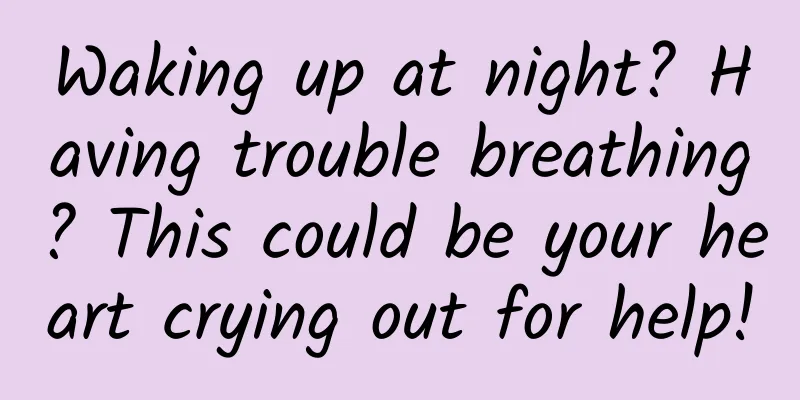Waking up at night? Having trouble breathing? This could be your heart crying out for help!

|
Author: Zhang Jianjun, Chief Physician, Beijing Chaoyang Hospital, Capital Medical University Reviewer: Zhang Haicheng, Chief Physician, Peking University People's Hospital In modern society, heart disease has become one of the major diseases that affect human health. With the accelerated pace of life and increased work pressure, the incidence of heart disease is increasing year by year. Heart disease is a general term for a large class of diseases caused by abnormal cardiac structure and function, including but not limited to hypertension, coronary heart disease, heart failure, valvular disease, myocarditis and cardiomyopathy, etc. These diseases may cause a series of clinical symptoms during their development, among which dyspnea is one of the most representative symptoms. Understanding the relationship between heart disease and dyspnea is important for early detection, diagnosis and treatment of the disease. The relationship between dyspnea and heart disease is complex and varied. People with heart disease often experience chest tightness and shortness of breath, but these symptoms may also be caused by other reasons. For example, young people may feel shortness of breath after experiencing greater work stress or emotional fluctuations, which may be caused by neurosis. Figure 1 Original copyright image, no permission to reprint In addition, lung diseases such as chronic bronchitis and emphysema can also cause similar respiratory symptoms. Therefore, when faced with these symptoms, you should carefully ask about the relevant characteristics in order to accurately distinguish whether it is caused by heart problems or other reasons. The reason why heart disease causes dyspnea and lower limb edema is that the heart's function as a pump is impaired, resulting in restricted blood flow. Specifically, the heart's contraction function is weakened, so that blood cannot be pumped out effectively, and thus accumulates inside the heart, further affecting pulmonary circulation, causing blood congestion in the lungs, and then causing pulmonary edema. In addition, systemic circulation congestion manifests as lower limb edema. If you suddenly feel dyspnea during sleep at night, are forced to sit up and are relieved later, this is usually regarded as an important sign of heart failure, namely nocturnal paroxysmal dyspnea. The mechanism of this phenomenon is that the amount of blood returning to the heart increases when lying flat, but the heart's pumping function does not improve accordingly, resulting in increased pulmonary circulation congestion. When faced with breathing difficulties that may be caused by heart failure, patients should take a series of measures to relieve symptoms. First of all, patients should reduce physical activity, avoid fatigue, and stand or sit instead of lying down. This is to reduce the burden on the heart and avoid aggravating pulmonary congestion. Secondly, you should pay attention to controlling water intake in your diet. Drinking too much water will aggravate water and sodium retention in the body, making breathing more severe. Figure 2 Original copyright image, no permission to reprint In addition, patients should seek medical help as soon as possible. In the hospital, doctors can use diuretics to help expel excess water from the body and relieve congestion in the pulmonary and systemic circulations. At the same time, doctors will develop corresponding treatment plans for specific causes of heart failure, such as high blood pressure and valvular disease, to fundamentally solve the problem and prevent further deterioration of the condition by controlling blood pressure and correcting valvular abnormalities. In addition, although palpitations may be related to heart disease, they may also be the result of many other factors. Palpitations refer to the patient's subjective feeling of abnormal heartbeat, including accelerated, slowed or irregular heartbeat. It may be caused by arrhythmias, such as premature beats and sinus tachycardia, or it may be secondary to heart diseases such as heart failure or pulmonary embolism. In addition, non-cardiac factors such as hyperthyroidism can also cause palpitations. Therefore, when palpitations occur, patients should seek medical attention in a timely manner and use electrocardiogram, dynamic electrocardiogram monitoring, cardiac ultrasound and other examination methods to determine whether there is a heart problem and its cause. If non-cardiac factors are suspected, further examination of thyroid function, D-dimer and other related indicators is required to exclude other potential health risks. |
<<: Chest pain is not just caused by heart disease, these causes should not be ignored either!
>>: What does your heart say when you faint?
Recommend
How many days after cesarean section can I get out of bed
I believe everyone has heard of Caesarean section...
After a coronary stent is placed, is it easy for the coronary artery to become blocked again? Taking antiplatelet drugs can prevent
A patient with coronary heart disease told Huazi ...
If you miss the golden recovery time for postpartum rehabilitation, is it still necessary to do pelvic floor rehabilitation?
I happened to meet an auntie who was dancing in t...
There is a cauliflower-like bump on the vulva
Vulvar growths are mostly considered to be flat w...
Is it effective to take progesterone if you don't have your period?
Under normal circumstances, girls usually start m...
White lochia after cesarean section
Generally, postpartum lochia is divided into thre...
Does abortion cause great harm to the ovaries?
In our lives, there are many women who have accid...
Premonitions of kidney stones in girls
Kidney stones are caused by abnormal accumulation...
Pregnancy more than 40 days a little spotting
First, check the B-ultrasound to determine the lo...
How to lose 10 pounds in three days during menstruation
Menstruation happens every month in girls, which ...
Body parts women shouldn't touch after sex
Refractory period It is common to feel tenderness...
The reason why leucorrhea contains blood
Changes in the color and smell of vaginal dischar...
How to get rid of accessory breasts in the armpits
If women have accessory breasts under the armpits...
What are the disadvantages of breast stickers?
The fashion pursued by beauty-loving women in mod...









